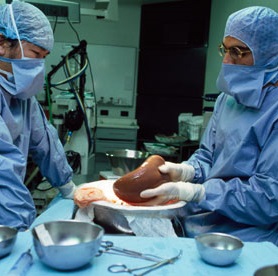Post-transplant cancer risk plotted
 Research has shown that liver transplant patients are more likely to fall victim to skin cancer.
Research has shown that liver transplant patients are more likely to fall victim to skin cancer.
The drugs which help the body get used to its new organ may contribute to the increased risk, coupled with the improved survivial rate and longer post-cancer lives of patients.
Figures show that of the 198 people who had a liver transplant or were managed post-transplant in South Australia between 1991 and 2010; a quarter of patients developed post-transplant malignancies, with skin cancer being the most common (16 per cent). The remaining nine per cent were solid organ malignancies such as lymphoma, lung, prostate and colorectal cancer.
SA Liver Transplant Unit Director Dr John Chen says it is likely the result of the side-effects of immunosuppressive drugs, which prevent the patient’s body from rejecting the organ.
“Transplant rejection used to be a major problem in the past but we’ve significantly improved the process of immunosuppression – the only problem is the side-effects remain an issue,” Dr Chen said.
“When you perform a transplant you have to lower the patient’s immunity so they don’t reject the organ but there’s a price to pay, and that price is an increased risk of infections and malignancies.”
The study suggested transplant recipients diagnosed with a skin cancer that could be treated locally had an excellent prognosis - with no progression, recurrence or deaths recorded from the skin malignancy. However, patients with solid tumours did not fare as well, with a survival rate of 47 per cent, compared with the skin cancer group’s 88 per cent during the follow-up period.
Dr Chen said those suitable for local therapy alone had satisfactory outcomes, however those with advanced malignancies requiring systemic therapy experienced significant treatment-related toxicities and had poor outcomes. He also says the success rate of transplants mean people live longer, and are more likely to fall victim to cancer later in life.
“The main thing we can do is regular check-ups for skin cancers, and for patients who are at high risk of other cancers, such as smokers, we can survey the aerodigestive tract and for older patients we can do periodic colonic surveillance to look for large bowel tumours... although it’s more common for liver transplant recipients to develop cancer, the good news is they can be cured with early detection and treatment,” he says.
Further details are available in the researchers' report.








 Print
Print